India, often called the land of traditions and spirituality, is home to a rich heritage of cultural and religious practices. Rituals in India hold deep symbolic meanings and are an integral part of people’s daily lives, festivals, and milestones. These rituals not only reflect faith but also preserve the values and customs passed down through generations. From birth ceremonies to grand festivals, every stage of life and occasion in India is marked with unique rituals. Let’s explore the different types of rituals in India.
1. Birth and Naming Rituals
The journey of rituals in an Indian’s life begins with birth. Families perform ceremonies to welcome the newborn and seek blessings for their health and future.
- Namkaran (Naming Ceremony): This ritual involves choosing a child’s name, often based on astrological calculations.
- Annaprashan (First Rice-Eating Ceremony): Conducted when a child is around six months old, this ritual marks the first time a baby eats solid food.
- Mundan (First Haircut): Shaving the child’s head symbolizes purity and the shedding of past negative karma.
2. Initiation Rituals
Many Indian communities follow initiation rituals that mark the transition of a child into learning, responsibility, and spirituality.
- Upanayan (Sacred Thread Ceremony): Practiced mainly among Hindus, this ritual introduces a boy to spiritual education.
- Vidyarambham (Beginning of Education): On this day, children write their first letters with the guidance of elders, seeking blessings for wisdom.
3. Marriage Rituals

Marriage is one of the most elaborate and celebrated occasions in India, with rituals varying by region, community, and religion.
- Haldi Ceremony: Applying turmeric paste to the bride and groom symbolizes purification and blessings.
- Mehendi Ceremony: The bride’s hands and feet are decorated with intricate henna designs.
- Saptapadi (Seven Steps): The couple takes seven vows around the sacred fire, signifying their bond for life.
Marriage rituals highlight the importance of unity, love, and family bonding in Indian society.
4. Festival Rituals
Festivals in India are incomplete without vibrant rituals. Each festival carries deep spiritual meanings and cultural significance.
- Diwali: Lighting diyas, performing Lakshmi Puja, and bursting crackers mark the festival of lights.
- Holi: Celebrated with colors, water play, and bonfires, Holi represents the victory of good over evil.
- Eid-ul-Fitr: Muslims in India celebrate Eid with special prayers, charity, and festive meals after a month of fasting.
- Christmas: Christians observe rituals like decorating Christmas trees, attending midnight mass, and exchanging gifts.
5. Death and Ancestor Worship Rituals
Rituals related to death in India emphasize the soul’s journey and honoring ancestors.
- Antyeshti (Last Rites): Performed to help the departed soul find peace, these rituals include cremation or burial.
- Shraddha and Pind Daan: Annual rituals conducted to pay respect to ancestors and seek blessings for the family.
These rituals highlight the Indian belief in the cycle of life, death, and rebirth.
6. Daily Religious Rituals
Apart from major ceremonies, daily rituals form the backbone of Indian spirituality.
- Puja (Prayer): Families often start the day by lighting lamps and offering prayers at home temples.
- Meditation and Yoga: Many practice spiritual disciplines as part of their daily routine.
- Aarti: Singing devotional hymns in front of deities is a common ritual across households and temples.
Rituals in India are not just religious practices; they are a celebration of life’s journey, spirituality, and togetherness. From birth to death, every stage is marked with meaningful customs that bind communities and preserve India’s cultural richness. These diverse rituals symbolize faith, love, respect, and devotion, making India one of the most spiritually vibrant countries in the world.
Navigating the Mosaic of Indian Culture
Exploring the Richness of Culture and Tradition in India
Read Also: Wedding Website Design
![]()





